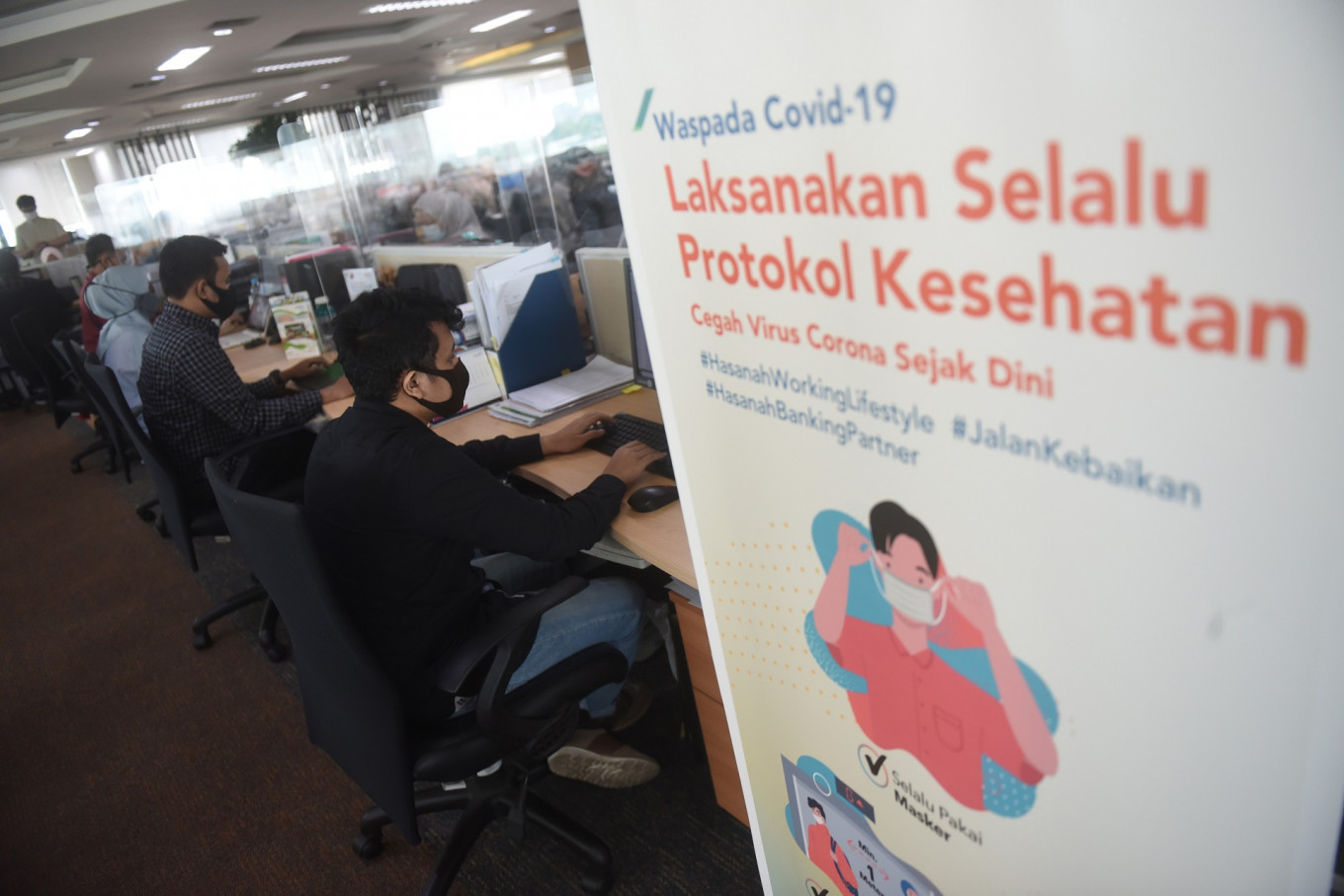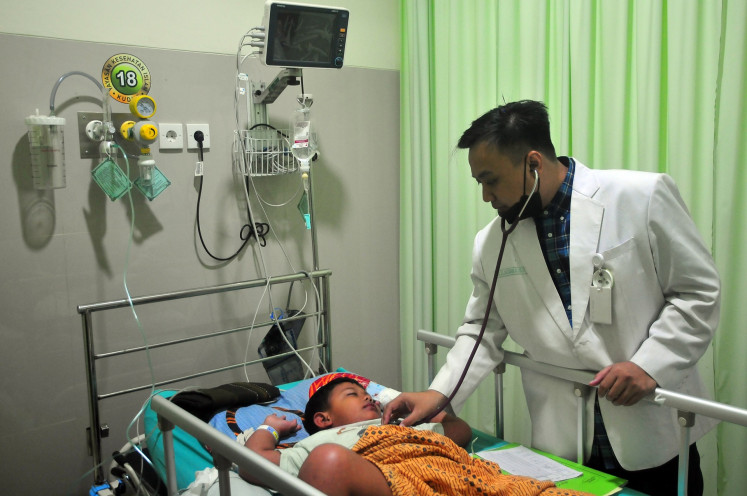Popular Reads
Top Results
Can't find what you're looking for?
View all search resultsPopular Reads
Top Results
Can't find what you're looking for?
View all search resultsResilient occupational safety, health systems key in pandemic
One of the many lessons learned from this crisis is the need for countries to have a sound and resilient OSH system in place.
Change text size
Gift Premium Articles
to Anyone
 Employees work in an office in Kuningan, South Jakarta, on Sept. 11, 2020. Nonessential workplaces and government offices are only allowed to have no more than 25 percent of their employees work in the office at any given time during the new large-scale social restrictions (PSBB) period in Jakarta. (Antara/Akbar Nugroho Gumay)
Employees work in an office in Kuningan, South Jakarta, on Sept. 11, 2020. Nonessential workplaces and government offices are only allowed to have no more than 25 percent of their employees work in the office at any given time during the new large-scale social restrictions (PSBB) period in Jakarta. (Antara/Akbar Nugroho Gumay)
T
he COVID-19 pandemic, with its profound impact on the world of work, underscores just how important occupational safety and health (OSH) is to all of us. Workplaces can easily become contaminated with the novel coronavirus, exposing workers, their families and communities to the risk of infection. No one should feel unsafe by just going to work.
In addition to the risk of infection, workers in all sectors face challenges brought about by new work practices and procedures adopted to mitigate the spread of the virus. Teleworking, for example, has led to ergonomic and psychosocial risks, with some 65 percent of surveyed enterprises reporting that worker morale has been difficult to sustain while working from home.
Certain workplaces have been particularly affected, such as the 136 million health and social workers at serious risk of acquiring COVID-19 during their work. Moreover, those workers, as well as essential staff in many other sectors, have faced increased workloads, longer working hours and reduced rest periods. The risk of violence and harassment at work has also risen, with consequences for both physical and mental well-being.
The protection of workers against sickness, disease and injury related to their work environment has been a central issue for the International Labor Organization (ILO) since 1919. From the onset of the COVID-19 crisis, the principles contained in ILO Occupational Safety and Health standards have shown to be more relevant than ever, especially the principle of prevention.
Faced with an unprecedented public health emergency, governments have taken rapid measures to curb the spread of the virus through public health systems. Actors in the world of work, and particularly in the field of OSH, have been crucial in the emergency response for protecting workers, including those who support public health systems.
At the same time, special attention is needed to ensure that policies and strategies do not discriminate against any workers, and consider those in vulnerable situations, including the youth, women, people with disabilities and migrant workers, the self-employed and those in the informal economy.
Amongst the many lessons learned from this crisis is the need for countries to have a sound and resilient OSH system in place. A system which can build capacity to face future emergencies and protect workers’ safety and health, while supporting the survival and business continuity of enterprises.
The key elements of a national OSH system are set out in the ILO’s Promotional Framework for Occupational Safety and Health Convention of 2006 (No. 187). They comprise a national OSH policy, regulatory and institutional frameworks; occupational health services; information, advisory services and training; data collection and research; and mechanisms for strengthening OSH management systems at the enterprise level to prevent and respond to OSH risks.
Investing in these systems enables countries to better face and recover from crises by safeguarding lives and livelihoods and advancing the protection of workers.
With the current situation in Indonesia, where the workplace has become one of the clusters of COVId-19 spread, the Manpower Ministry has issued guidelines for employers regarding handling of COVID-19 in the workplace. The guidelines cover work-related risk assessment for workers and suggest to integrate COVID-19 protocols into companies’ existing OSH and on-going health programs, such as the first aiders to handle emergency cases at work, mental health, HIV/AIDS and TB.
It is quite encouraging that the use of the guidelines has the support of employers' associations and trade unions. Joint efforts by employers and workers will strengthen understanding that COVID-19 is a common challenge, and the ultimate goal is to keep the workers and business safe.
Indeed, the COVID-19 pandemic has furthermore demonstrated the importance of social dialogue between governments, employers and workers’ organizations not only in responding to crises but also in promoting good OSH conditions. A climate of trust, built through social dialogue, is essential for the effective implementation of measures to address emergencies such as COVID-19, which require quick but effective action. Mechanisms for social dialogue create a strong foundation for building resilience.
COVID-19 has undoubtedly been one of the gravest occupational safety and health challenges the world has ever faced. Through the concerted action and commitment of all stakeholders let us together forge the strong and effective national OSH systems we need to safeguard the life and health of every worker for years to come.
***
The writer is the country director of the International Labor Organization (ILO).








